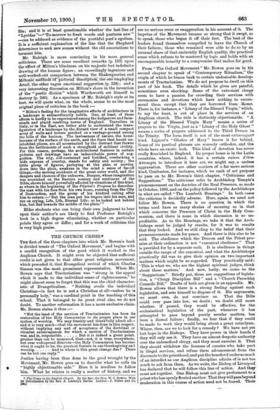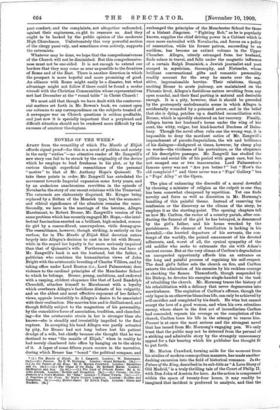THE CHURCH CRISIS.*
THE first of the three chapters into which Mr. Bowen's book
is divided treats of "The Oxford Movement," and begins with a candid recognition of the good which it worked in the Anglican Church. It might even be objected that sufficient credit is not given to that other great religious movement, which preceded it, that Evangelical revival of which Charles Simeon waa • the-- most prominent representative. When- Mr. Bowen says that Tractarianism was " strong in the appeal which it made to the individual sense of righteousness," he might almost seem to forget that this was the chief character- istic of Evangelicalism. " Nothing avails the individual
Christian—in fact he is not a Christian at all—unless he is personally holy," was a cardinal point in the teaching of this school. That it belonged to its great rival also, we do not
doubt. To another reformation it has a more exclusive claim. Mr. Bowen states it thus :—
"Not the least of the services of Tractarianism has been its restoration of the Holy Communion to its proper place in our system of worship. We may frankly and thankfully admit all— and it is very much—that the movement has done in this respect, without implying any sort of acceptance of the doctrinal or ritualist extravagances for which a section of Tractarianism
was, and is, responsible But it is indeed a great point, greater than can be measured, that—not, it is true, everywhere, but over widespread districts—the Holy Communion has become what it ought to be, the greatest feature in our thanksgiving and worship And to whom is this great change due ? There can be but one reply."
Justice having been thus done to the good wrought by the Movement, Mr. Bowen goes on to describe what he calls its " highly objectionable side." Here it is needless to follow him. What he relates is really a matter of history, and we
The Crisis in the English Church. By the Rev. the Hon. W. C. Bowen. With an Introduction by the Rev. J. Llewelyn Davies. London : J. Nisbet and Co. Dal
see no serious error or exaggeration in his account of it. The impetus of the Movement became so [strong that it swept, so to speak, those who began it off their feet. The best of the leaders found themselves compelled to leave the Church of their fathers ; those who remained were able to do so by an unusual share of that eminently English quality, the practical sense which refuses to be mastered by logic and holds with an unconquerable tenacity to a compromise that makes for good.
From " The Oxford Movement" Mr. Bowen goes on in his second chapter to speak of " Contemporary Ritualism," the origin of which he traces back to certain undesirable develop- ments of Tractarianism. We do not propose to dwell on tide part of his book. The details which he gives are painful) sometimes even shocking. Some of the extremist clergy, seem to have a passion for crowding their services with ceremonies and devotions which have nothing to recom- mend them except that they are borrowed from Rome. There is, for instance, a " Litany of the Blessed Virgin," which, to say the least, is out of place in the services of an Anglican church. The title is distinctly objectionable. " A Litany of the Blessed Virgin Mary " means a series of prayers to the Virgin, just as a " Litany of the Holy Ghost " means a series of prayers addressed to the Third Person ink the Trinity. The form itself is not of the most extravagant' kind. Liguori's " Glories of Mary " leaves it far behind, Some of its poetical phrases are scarcely orthodox, and the whole have an exotic look. This kind of devotion has never really flourished in England. Its proper home is in the Latin countries, where, indeed, it has a certain raison dam Attempts to introduce it here are, we might say, a useless aggravation. There are other matters of a far more serious kind, Confession, for instance, which we omit of set purpose to pass on to Mr. Bowen's third chapter, " Criticisms and Suggestions." The criticisms refer to Archbishop Temple's pronouncement on the doctrine of the Real Presence, as made in October, 1898, and on the policy followed by the Archbishops in what are called " The Lambeth Hearings." In both cases the criticism is decidedly adverse. Here, again, we need not follow Mr. Bowen. There is no question in which the terms used have so many shades of meaning as in that which concerns the Presence of Christ in the Holy Com- munion, and there is none in which discussion is so un- profitable. As to the Hearings, we take it that the Arch- bishops must be judged by results, for it was to results that they looked. And we still cling to the belief that their pronouncements made for peace. And there is this also to be said. The obedience which the Deacon and the Priest pro- mise at their ordination is not "canonical obedience." That is provided for by a separate oath. It is obedience in things outside the range of the canonical, and what the Archbishops practically did was to give their opinion on two important matters which might be so regarded. They practically said : This is what we, who are the highest spiritual judges, think about these matters.' And now, lastly, we come to the " Suggestions." Briefly put, these are suggestions of legisla- tion, a " Clergy Discipline Bill " and a " Church Parochial Councils Bill." Drafts of both are given in an appendix. Mr. Bowen allows that there is a strong feeling against such legislation, and sets himself to dispose of it. His arguments, we must own, do not convince us. That the Bills could ever pass into law, we doubt ; we doubt still more whether, if passed, they would be effective, for the ecclesiastical legislation of the past, whenever it has attempted to pass beyond purely secular matters, has been a dismal failure ; finally, we fear that if they could be made to work they would bring about a great cataclysm. Where, then, are we to look for a remedy ? We have not yet lost hope in the Bishops. They have power in their hands if they will only use it. They have an almost despotic authority over the unbeneficed clergy, and they must exercise it. That they should withdraw the licenses of curates who take part in illegal services, and refuse them advancement from the diaconate to the priesthood, and put the beneficed under so much of an interdict as our Anglican discipline admits of is not too much to ask from them. As we write, the Bishop of Liverpool has declared that he will follow this line of action. And they must act together. One Bishop must not give preferment to a priest who has openly flouted another. That they will pass beyond moderation in this course of action need not be feared. Their
past conduct, and the complaints, not altogether unfounded, against their supineness, ought to reassure us. And they ought to be backed by the public opinion of the moderate High Churchmen. Unfortunately this very powerful section of the clergy passively, and sometimes even actively, supports the extremists.
Whatever may be done, we hope that the comprehensiveness of the Church will not be diminished. But this comprehensive- ness must not be one-sided. It is not enough to extend our borders that they may come as near as possible to the frontiers of Rome and of the East. There is another direction in which the prospect is more hopeful and more promising of good. An alliance with Rome might easily be a disaster, but what advantage might not follow if there could be found a modus riven& with the Christian Communities whose representatives met last December at the " round table " in Christ Church !
We must add that though we have dealt with the controver- sial matters set forth in Mr. Bowen's book, we cannot open our columns to any correspondence on the subjects treated of. A newspaper war on Church questions is seldom profitable, and just now it is specially important that a perplexed and difficult situation should not be rendered more difficult by the excesses of amateur theologians.







































 Previous page
Previous page